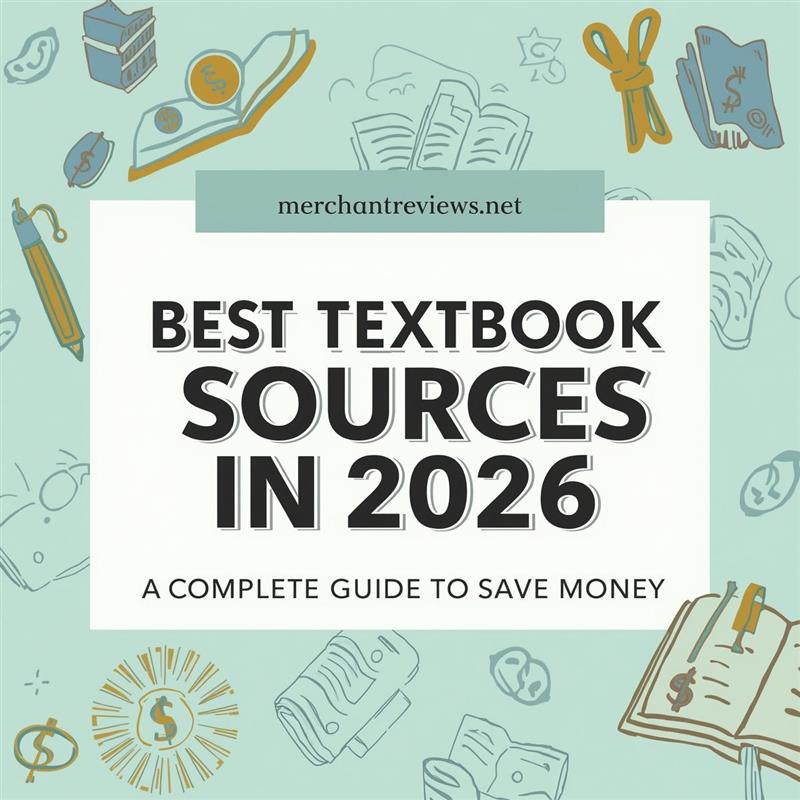
The cost of a college education continues to soar, and often the most insidious expense is textbooks. Publishers routinely issue minor revisions just to justify a triple-digit price tag, leaving students broke and desperate. But by 2026, the smart student knows that paying full price is a choice, not a necessity.
This comprehensive guide is designed for the savvy US student, breaking down the 10 most effective sources for academic materials. From price-comparison mastery to legally free resources and advanced digital tactics, mastering these sources is the key to balancing your budget without sacrificing your grades.
Strategy 1: The Commercial Marketplace (Buying, Renting, and Comparing)
Before you buy, rent, or even look for free files, you need a strategy to ensure you’re getting the best possible deal from the traditional commercial market.
1. Price Comparison Engines (BookScouter & CampusBooks)
The single most effective action you can take to save money is using a price comparison engine. These platforms instantly crawl dozens of online vendors—including Chegg, Amazon, ValoreBooks, and smaller retailers—to show you the lowest available price for buying or renting any textbook based on its ISBN.1 Using one of these sites should be your first step every semester.
Why You Must Start Here
Comparison sites often expose massive price variations. A book that costs $200 on one vendor’s site might be available for rent at $40 on another, with coupons included. Relying on a single vendor means you are leaving money on the table 99% of the time.
Master the Buyback Offer
Many comparison sites also include a “Sell” function. Before you even buy the book, you can check the guaranteed buyback price. If you can buy a used book for $80 and sell it back at the end of the term for $60, your true cost was only $20. This calculation is vital to minimizing your actual expense.
2. Chegg: Rental Powerhouse
Chegg pioneered the student rental market and remains a dominant force for a reason. They specialize in rentals, offering favorable terms and a massive inventory of both physical and digital textbooks. If you know you only need the book for one semester and it’s too new to be free, renting is often the best choice.
Chegg’s Rental Advantage
Chegg is known for its flexibility: free return shipping, clear return dates, and occasionally, short-term extensions. They also often provide a digital trial while the physical book is shipping, ensuring you don’t fall behind on classwork.
The Rental vs. Buy Calculation
Only choose to buy a textbook if your required course material is a foundational text you know you will use later in your career (e.g., Principles of Economics). For all other courses, renting eliminates the headache of trying to find a buyer at the end of the semester.
3. Amazon: The Everything Market
Amazon’s massive infrastructure and marketplace make it an unavoidable source for both physical books and digital media. Its strength lies in sheer volume and convenience, especially for Prime Student members.
Leveraging the Kindle Rental Ecosystem
If your professor allows digital copies, renting the Kindle version for a semester is often the cheapest legal path. This is instantaneous, removes shipping costs, and allows for easy searching and annotation.
Using the Amazon Used Marketplace Safely
When buying used from Amazon, always check the seller’s rating and verify the ISBN twice. Be wary of books advertised as “international editions” unless you are confident in that strategy (see Strategy 3), as a misleading listing could result in the wrong course materials.
Strategy 2: The Zero-Cost Ecosystem (Free & Legal Sources)
The most sustainable way to save money is by using Open Educational Resources (OER) and institutionally supported platforms. These sources are 100% legal, often peer-reviewed, and completely free.
4. Open Educational Resources (OER)
OER are high-quality, free-to-use teaching and learning materials.2 They are a direct challenge to the commercial textbook model and are increasingly adopted by universities nationwide.
OpenStax: Free, Peer-Reviewed Core Texts
Founded by Rice University, OpenStax is the leading OER provider, offering professionally written and peer-reviewed textbooks for over 40 high-enrollment college courses (Physics, Biology, Calculus, etc.). If your professor assigns an OpenStax book, your savings are $0.3
LibreTexts: The STEM & Specialized OER Hub
LibreTexts is a powerful resource built by educators, specializing in collaboratively built, high-quality content, particularly strong in STEM fields.4 It allows for remixing and adapting materials, meaning you might find content perfectly tailored to your course.
5. Institutional & Public Libraries
Never underestimate the power of your library card. Your university library remains your first and best resource for legal, free access to course materials.
University Reserves and Interlibrary Loan (ILL)
Ask your professor if the required book has been placed on Course Reserve. This allows you to check out the physical textbook for a short, controlled period (usually 2-4 hours) for free. If the book is not available, utilize the Interlibrary Loan (ILL) system to borrow it from a different university’s collection.
The Internet Archive / Open Library (Digital borrowing)
The Internet Archive and its Open Library initiative operate a legal system of “Controlled Digital Lending.” You can “borrow” digitized copies of physical books for free, often for a period of 14 days. This is a crucial lifeline for older or non-essential texts.
6. Academic Ebook Aggregators (DOAB & Project MUSE)
For advanced studies, graduate work, or niche subjects, look beyond standard OER and tap into university-published content.
Finding Free University Press Titles
The Directory of Open Access Books (DOAB) and Project MUSE (which often partners with libraries to offer free access) are excellent gateways to finding high-quality academic monographs and textbooks published by university presses.5 These sources are most valuable for upper-division and humanities courses where standard OER may not exist.
Strategy 3: Advanced Tactics and Digital Repositories
These final sources require more searching and, in some cases, involve navigating ethical and legal gray areas, but they represent the ultimate resource for the dedicated money-saving student.
7. International & Secondhand Specialists (AbeBooks / Biblio)
These sites specialize in connecting you with small, independent bookstores globally.
The International Edition Loophole
Publishers create cheaper “International Editions” for sale outside the US.These books contain the same content (though often in softcover and occasionally with black-and-white images). Buying a used international edition through platforms like AbeBooks or Biblio is dramatically cheaper than the US version.
8. Digital Repository Network (Anna’s Archive)
When legal, free resources fail, many students turn to comprehensive search tools like Anna’s Archive. It functions as a meta-search engine, indexing and providing links to digital files found across multiple open libraries, shadow libraries, and academic databases.
9. Library Genesis (LibGen)
For over a decade, Library Genesis (LibGen) has been a student mainstay. It is one of the largest independent repositories of academic journals, monographs, and textbooks, often having versions of files that no other site possesses.
A Cautionary Note on Copyright and Access Stability
Both Anna’s Archive and LibGen exist in a legal grey area; accessing and downloading copyrighted material is a violation of copyright law. Furthermore, university networks often block access to these sites, and their domains frequently change. Proceed with caution and consult your institution’s policy regarding unauthorized file sharing.
10. Direct Peer-to-Peer Selling (Reddit, Facebook Groups)
Sometimes the simplest solution is the best. Students from the previous semester are your most reliable and affordable source.
Buying Locally and Avoiding Shipping Fees
Search local student Facebook groups, university subreddits, or dedicated campus apps to find classmates selling the exact edition you need. You save on shipping and can inspect the book before buying, guaranteeing you avoid any access code issues.
Final Warning: The Unavoidable Cost
The Access Code Trap
The single greatest financial obstacle remaining for students in 2026 is the required access code. Publishers have strategically moved mandatory quizzes, homework, and labs to proprietary online platforms (e.g., McGraw Hill Connect, Pearson MyLab).
Why Publishers Win
If your grade depends on completing homework on one of these platforms, you must buy the access code. This bypasses all rental, used, and free textbook strategies. Often, the code comes bundled with the digital textbook, making the textbook itself seem free, but locking you into the high price of the code.
Your best defense: Always ask your professor on day one if the online homework platform is required for a grade. If it is, the safest and sometimes cheapest path is to buy the code directly from the publisher’s site, skipping the bookstore entirely.
By mastering these 10 sources, you equip yourself with the strategies needed to beat the textbook racket. Use the comparison tools first, prioritize the OER sources, and treat every purchase decision as an investment—or, ideally, an expense you avoided entirely.
